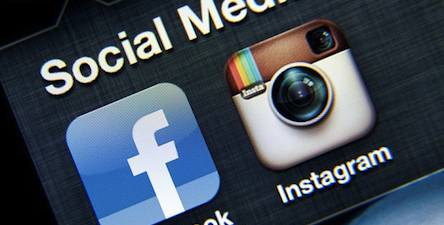If you missed the news (http://bit.ly/V7uCh3), you have until January 16th to delete your Instagram account, or you’re automatically opted-in to their new terms of use, which allows Instagram and its Facebook overlords to use your content for commercial purposes without your permission or consultation.
When the story broke, I began to understand how my parents must have felt when they caught me shoplifting or drinking booze as a teenager not angry, just disappointed.

Photo: Facebook-owned Instagram is to use photos in commercial purposes, photo from The Telegraph
I never expected that Facebook would just «give» us Instragram, but it seems they’re going out of their way to prove that there’s no such thing as a free (washed-out, sepia-tinted photo of) lunch.
Part of the problem is that last April, Facebook paid $1 billion for Instagram and, call me a cynic, but I reckon they expect some return on that investment. I’m not an expert, I’ve never spent a billion dollars on anything, but I have paid for an engagement ring, so I understand the basics of ROI.
Unfortunately, Facebook is learning that even a cool billion can’t buy you love, as celebs, musicians and Mia Farrow have abandoned Instagram in protest of the new regulations. It’s unclear at this stage if this departure is going to put a problematic, dent in Instagram’s subscriber base of 40 million users, but it can’t be a pleasant time for them none-the-less.
The other part the problem is that we’ve come to expect free world-class web services, because that’s how we (mistakenly) think of them. On the surface, Google, Twitter, Facebook, Foursquare and Instagram all look like they cost us nothing, because they cost us no money. But unfortunately, they all cost us information, which we don’t value, but which is gold dust to the people who actually do want our money.
It’s not that we believe that all of these companies are building amazing social tools for us out of the goodness of their own hearts, it’s just that I don’t think we’re collectively aware of how much personal data gets sucked out and sold to third parties who we wouldn’t normally want to deal with.
Now I’m not begrudging the right of Facebook, Twitter or Instagram to make money off their services, I just wish they would be a little more transparent about how they do it, so that we could make more informed choices.
If I had my way, free Internet services would all come with a sticker on the front which says, «This service is free for you to use, but here’s how we make money off it:
80% — We sell your user data and demographic information to advertisers
10% — We plunder your content for ideas, which we then develop and sell to our clients
10% — We’re natural voyeurs and providing our engineers access to your personal content saves us a fortune in legal fees.
I’m not sure if this sticker will take off as an idea, but it would at least mean that while we’re eating our «free lunch,» we’re aware that the wait-staff is going through our wallets, not for cash, but for our badly taken photos of our children, our painted fingernails and, of course, our cats.
About the Author

Kent is the Engagement Director of Last Exit, a New York and London based digital strategy, marketing and design agency whose services include digital research & strategy, creative campaign formulation and management, SEO and analytics, interactive design and technical delivery.
Kent has over 10 years digital experience working with brands including Sony, Nokia and Qantas. He is a mobile and social media specialist and has written about technology for publications such as The Age and the Huffington Post UK. He is also an award-winning stand-up comedian.